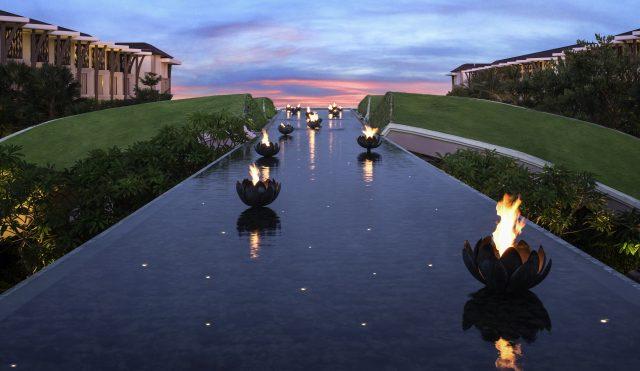The hotel market performed relatively poorly throughout 2017, based on the occupancy and room rate indicators. The Presidential instruction to banned official meetings to be held in hotel and continued influx of new hotel projects have rubbed salt into the wound.
Despite of attracting Chinese tourists, the government also has set to target of attracting 2,1 million European tourists to the country. Soon on the back of strong tourism arrival, the demand for hotel rooms in Indonesia is expected to continue positively in the year ahead.
AccorHotels is among international hotel chains who still sees potential for more hotels in Indonesia, especially in greeter Jakarta and in the eastern part of Indonesia. The Paris-based hospitality company plans to open 17 more hotels across Indonesia this year as part of its long-term program to build at least 200 hotels by 2020.
Garth Simmons, CEO AccorHotels Malaysia-Indonesia-Singapore since June 2015 recently spoke to Saviq Bachdar from Marketeers about the investment opportunity in hospitality industry and the development of tourism in Indonesia. Here is an excerpt.
Where do you see the opportunity in developing or investing in hotels in Indonesia?
Indonesia remains one of Asia’s popular tourist destinations and provides hotel chains with significant opportunities for growth. We saw international tourist arrivals and domestic travellers movement has grown significantly, and the numbers are forecasted positively maintaining 5% compounded annual growth rate.
In early years, many of the international hotel chains have focused on the upscale or luxury hotels in Indonesia. However, with the increasing numbers of middle class and millennial travelers later today, we can see tremendous opportunities for economy and mid-scale hotels.
In terms of connectivity, the market has provided broader options for middle class and also millennials to travel by low cost carriers, and choose more affordable hotels to stay.
Beyond main markets such as Bali and Yogyakarta (for leisure) and Jakarta (business), Makassar has become an important hub for travel industry, especially in connecting destination to Eastern part of Indonesia.
How are you assessing the opportunities and reach out to the Indonesian owners?
Let me explain this briefly why investors choose us to manage their hotel properties. First, AccorHotels is the world’s leading hotel operator with more than 4,000 hotels globally looks after thousands of guest every day in 95 countries, including Indonesia.
Second, AccorHotels has been serving Indonesia’s hospitality industry since 1993. We are now the largest international operator operating in Indonesia with more than 100 hotels in operations and another 100 hotels in the pipeline.
Third, we also have the comprehensive portfolio worldwide, not only hotel brands, but also travel and lifestyle group. It comprises internationally acclaimed luxury and upscale brands including Raffles, Fairmont, Sofitel Legend, SO Sofitel, Sofitel, ss well as the popular midscale and boutique brands of Novotel, Mercure, and in-demand economy brands including ibis, ibis Styles, ibis budget.
Last but not least, AccorHotels reinvented digital hospitality transformation with €225-million investment, and positioned AccorHotels as the leader in digital hospitality. The focus of the transformation is enhancing customer experience through digital technology, providing digital solutions for our owners and employees.
What are the key challenges in Indonesian hospitality industry? How do you overcome them?
In the World Economic Forum’s Travel & Tourism Competitiveness Report, which measures the set of factors and policies that enable the sustainable development of the Travel & Tourism sector, which in turn, contributes to the development and competitiveness of a country,” Indonesia jumped from rank 70th in 2013 to 50th in 2015, an impressive improvement.
The report states that the competitive advantages of Indonesia are price competitiveness, rich natural resources (biodiversity), and the presence of several heritage sites.
However, the report also stated that Indonesia is not placing enough emphasis on environmental sustainability (resulting in deforestation and endangered species, while only a minimal fraction of the used water is treated). The report also mentions safety and security concerns.
The lack of adequate infrastructure in Indonesia is a persistent problem, not only because its raises logistics costs steeply thus making the investment climate less attractive but also because it limits the smoothness of traveling for tourists.
The lack of inter and intra island connectivity means that a number of Indonesian regions that contain huge tourist potential cannot be reached easily.
Tourism of Ministry aims to reach 20 millions tourist by 2019, what is your outlook for the country’s hospitality industry for the short and medium term?
There is little doubt that the travel and hospitality competitive landscape is changing much soon in the future. However, one very evident trend is increasing consolidation, especially among hotels. Recent examples include AccorHotels acquired Fairmont, Raffles, and Swissôtel to strengthen its position in the luxury segment.
We also see the millennial hospitality trend is growing in Indonesia. Millennials, individuals born during the early 1980s to early 2000s, are coming of age and influencing the consumption and travel behaviors of both older and younger generations.
Millennials want personalized communication (via multiple electronic platforms), seamless planning, flawless execution, and an authentic, customized travel experience. Therefore, digital is a must for travel and hospitality organisations like AccorHotels, we are ready to grab this millennial market segment.
Accor & FRHI is just one of many big mergers in 2016. How does this acquisition impact Accor’s business in Indonesia?
The acquisition of FRHI Hotels & Resorts by AccorHotels is a global strategic plan. We have 3 hotels in Indonesia, Raffles Jakarta, Fairmont Senayan Jakarta and Fairmont Sanur Beach, and they have become a great addition to our Luxury and Upscale brand hotels in Indonesia.
Through the acquisition, AccorHotels will also offer Indonesian guests access to unrivaled choice of destinations for our guests.
AccorHotels is now a stronger and more diverse organization with the addition of the Fairmont, Raffles and Swissôtel brands. Consolidating the market from both organization, the acquisition will give impact through significant revenue growth, maximization of hotel earnings, increased efficiency of marketing, sales and distribution channels, and the combination of operational expertise and talent within the combined entity.


